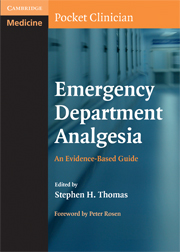Book contents
- Emergency Department Analgesia
- Emergency Department Analgesia
- Copyright page
- Contents
- Contributors
- Foreword
- Preface
- Acknowledgments
- Abbreviations
- General considerations
- Chief complaints and diagnoses
- Abdominal aortic aneurysm
- Aortic dissection
- Arthritis
- Biliary tract pain
- Bites and stings – marine
- Bites and stings – terrestrial
- Breast pain
- Burns
- Bursitis and periarticular inflammation
- Cancer and tumor pain
- Cardiac chest pain
- Chest wall trauma
- Chronic low-back pain
- Cluster headache
- Corneal abrasion
- Cystitis, urethritis, and prostatitis
- Dysmenorrhea
- Endometriosis
- Esophageal spasm
- Fibromyalgia
- Gastritis and peptic ulcer disease
- Gastroesophageal reflux disease
- Hemorrhoids and perianal pain
- Migraine and undifferentiated headache
- Mucositis and stomatitis
- Neck and back pain – mechanical strain
- Neck and back pain – radicular syndromes
- Neck and back pain – spinal spondylitic syndromes
- Neuropathy – complex regional pain syndrome
- Neuropathy – diabetic
- Neuropathy – HIV related
- Neuropathy – overview
- Neuropathy – phantom limb pain
- Ocular inflammation
- Odontalgia
- Orthopedic extremity trauma – sprains, strains, and fractures
- Osteoporotic vertebral compression fracture
- Otitis media and externa
- Pancreatitis
- Pharyngitis
- Postdural puncture headache
- Post-herpetic neuralgia
- Renal colic
- Sialolithiasis
- Sickle cell crisis
- Temporomandibular disorders
- Tension-type headache
- Trigeminal neuralgia
- Undifferentiated abdominal pain
- Tables
Undifferentiated abdominal pain
from Chief complaints and diagnoses
Published online by Cambridge University Press: 18 December 2009
- Emergency Department Analgesia
- Emergency Department Analgesia
- Copyright page
- Contents
- Contributors
- Foreword
- Preface
- Acknowledgments
- Abbreviations
- General considerations
- Chief complaints and diagnoses
- Abdominal aortic aneurysm
- Aortic dissection
- Arthritis
- Biliary tract pain
- Bites and stings – marine
- Bites and stings – terrestrial
- Breast pain
- Burns
- Bursitis and periarticular inflammation
- Cancer and tumor pain
- Cardiac chest pain
- Chest wall trauma
- Chronic low-back pain
- Cluster headache
- Corneal abrasion
- Cystitis, urethritis, and prostatitis
- Dysmenorrhea
- Endometriosis
- Esophageal spasm
- Fibromyalgia
- Gastritis and peptic ulcer disease
- Gastroesophageal reflux disease
- Hemorrhoids and perianal pain
- Migraine and undifferentiated headache
- Mucositis and stomatitis
- Neck and back pain – mechanical strain
- Neck and back pain – radicular syndromes
- Neck and back pain – spinal spondylitic syndromes
- Neuropathy – complex regional pain syndrome
- Neuropathy – diabetic
- Neuropathy – HIV related
- Neuropathy – overview
- Neuropathy – phantom limb pain
- Ocular inflammation
- Odontalgia
- Orthopedic extremity trauma – sprains, strains, and fractures
- Osteoporotic vertebral compression fracture
- Otitis media and externa
- Pancreatitis
- Pharyngitis
- Postdural puncture headache
- Post-herpetic neuralgia
- Renal colic
- Sialolithiasis
- Sickle cell crisis
- Temporomandibular disorders
- Tension-type headache
- Trigeminal neuralgia
- Undifferentiated abdominal pain
- Tables
Summary
- Type
- Chapter
- Information
- Emergency Department AnalgesiaAn Evidence-Based Guide, pp. 392 - 397Publisher: Cambridge University PressPrint publication year: 2008

